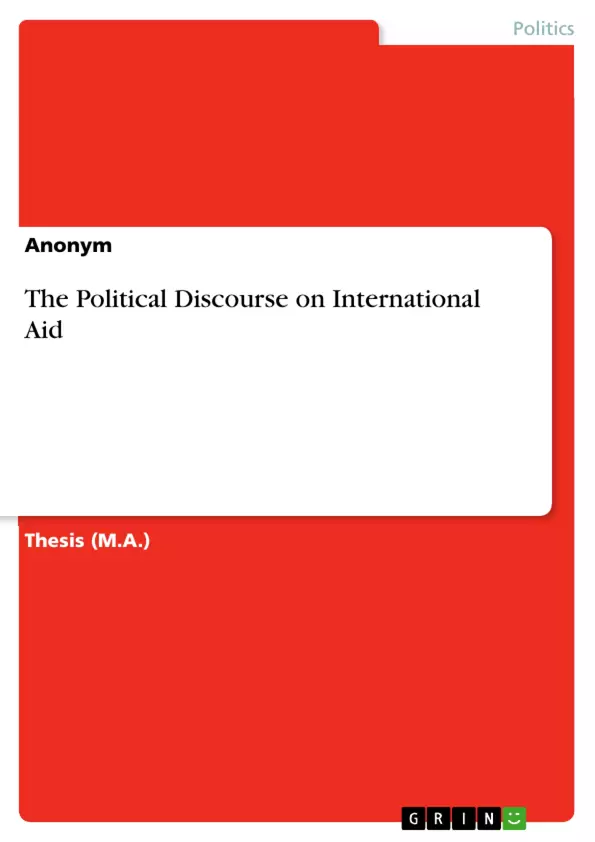The goal of the study is to identify and analyse the concept of international aid and political discourse on it. It compares foreign aid with theory of neocolonialism. What does development aid have to do with the theory of neocolonialism? Is international aid a mean to conduct neocolonialism? Should international aid be called aid?
Chapter 1 is introductory and describes multiple theories related to colonialism and neocolonialism, such as eurocentrism, orientalism, imperialism, globalisation post-colonialism and others. Chapter 2 presents a great array of speeches, interviews
and other documents from recent years which raise the topic of international aid. Chapter 3 consists of 2 parts. Part one focuses of the concept of international aid.
The second part explains what political discourse has to do with neocolonialism. It examines the words of politician in the light of neocolonial theories. It investigates if international aid is really an aid. At the end conclusions are drawn. The analysis of multiple speeches interviews and documents showed that there is a great amount of similarities in those to 2 concepts. Indeed, international aid might be a way to conduct neocolonialism.
Inhaltsverzeichnis (Table of Contents)
- Acronyms and Abbreviations
- Introduction
- Chapter 1: Theory of colonisation. Developmentalism
- Colonialism
- Neoclonialism
- The concept of cultural Hegemony
- Imperialism
- Orientalism
- Eurocentrism
- Westernisation
- Globalization
- Post-colonial theory
- Developmentalism
- Critics on developmentalism
- Chapter II: Discourse on international aid
- Barack Obama
- Angela Merkel
- Hilary Clinton
- Donald Trump
- Teresa May
- Jean-Clause Juncker
- Gerd Muller
- Emmanuel Macron
- Remy Rioux
- David Cameron
- Review
- Chapter III: International Aid and its analysis
- International aid
- Measuring international aid: ODA
- DAC
- The donor countries
- Biggest recipients of aid
- Document analysis
- Everyone wants to be the biggest donor -the leadership race
- Developmentalism and eurocentrism - the Western superiority
- We help those who do what we want them to do the power of influence
- The West is more open to speak about donors' benefits
- International aid and neocolonialism
- Case study: The British in Botswana
- Conclusions
Zielsetzung und Themenschwerpunkte (Objectives and Key Themes)
This study aims to identify and analyze the concept of international aid and the political discourse surrounding it. It compares foreign aid with the theory of neocolonialism, examining whether development aid is a tool for neocolonial practices. The study investigates the nature of international aid and whether it truly serves as aid.
- The concept of international aid
- The relationship between international aid and neocolonialism
- The discourse on international aid by political figures
- The analysis of international aid practices and their impact
- The role of Western actors in shaping international aid policies
Zusammenfassung der Kapitel (Chapter Summaries)
Chapter 1 introduces various theories related to colonialism and neocolonialism, including eurocentrism, orientalism, imperialism, globalization, and post-colonialism. It discusses developmentalism and its critiques.
Chapter 2 examines the discourse on international aid through speeches, interviews, and other documents from prominent political figures such as Barack Obama, Angela Merkel, Hilary Clinton, Donald Trump, Teresa May, Jean-Clause Juncker, Gerd Muller, Emmanuel Macron, Remy Rioux, and David Cameron.
Chapter 3 focuses on the concept of international aid, exploring its measurement, the roles of donor countries, and the recipients of aid. It analyzes various documents related to international aid, examining themes like the leadership race for being the biggest donor, developmentalism and eurocentrism, the power of influence through aid, and the potential for international aid to be used for neocolonial purposes. A case study on the British in Botswana illustrates the potential for neocolonial practices in international aid.
Schlüsselwörter (Keywords)
The study explores key terms and concepts such as international aid, neocolonialism, development aid, political discourse, colonialism, eurocentrism, orientalism, imperialism, globalization, post-colonial theory, developmentalism, donor countries, recipients of aid, and power of influence.
Frequently Asked Questions
Is international aid a form of neocolonialism?
The study suggests that international aid might indeed be a tool used by Western nations to conduct neocolonialism and maintain influence.
Which political figures are analyzed in the discourse?
The study analyzes speeches from Barack Obama, Angela Merkel, Donald Trump, Emmanuel Macron, and others.
What is ODA and how is it measured?
Official Development Assistance (ODA) is the standard metric used to measure international aid flows from donor to recipient countries.
What does the case study on Botswana reveal?
It illustrates the potential for neocolonial practices and power dynamics between former colonial powers and recipient nations.
What is the concept of cultural hegemony in this context?
It refers to the dominance of Western values and "developmentalism" that justifies the intervention in other countries' affairs.
- Quote paper
- Anonym (Author), 2019, The Political Discourse on International Aid, Munich, GRIN Verlag, https://www.grin.com/document/948027



